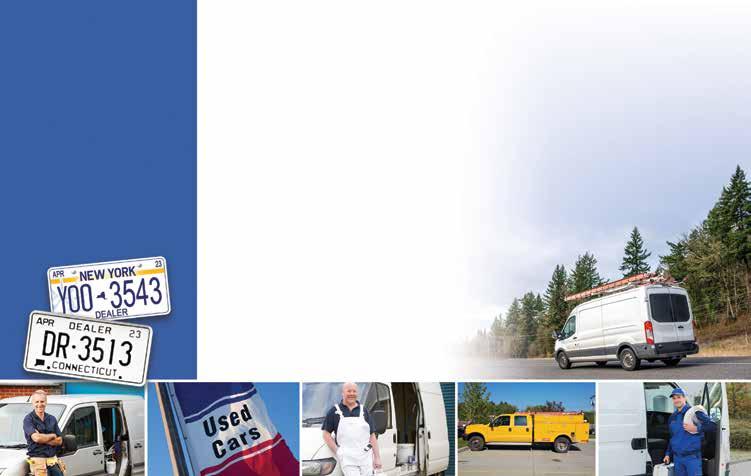
7 minute read
Ask PIA
FEMA assistance, seawall damage and more
Natural disaster courses
Q. I saw a New York law that makes homeowners eligible for a reduction of their fire, homeowners and property insurance premiums if they complete a course on natural disaster preparedness, home safety and loss prevention. Where can I find information on these courses?
A. Information on these courses can be found at the New York State Citizen Preparedness Corps. website (www.prepare.ny.gov/training-events). The New York State Department of Financial Services also has encouraged property/casualty insurers to submit their disaster-preparedness courses for approval, so consumers may complete them for the discount. For more information, see the DFS press release at on.ny.gov/3y1FkO4.—Bradford J. Lachut, Esq.
Fallen tree
Q. Because of weakness caused by termites, a tree fell from a neighbor’s yard onto our insured’s home. Should our insured make a liability claim against the neighbor, or should he present a property claim against his policy?
A. To recover from the neighbor’s insurance policy, your insured must prove the neighbor was negligent in his maintenance of the tree. To prevent delays in repairing the damage, your insured should turn this claim in as a property claim, and let the insurer decide whether to subrogate.—Helen K. Horn, CIC, CPIA, CISR
FEMA’s HO declination requirement for disaster assistance
Q. My clients—whose house suffered only flood damage—are being required to get a declination of coverage from their homeowners insurer in order to collect FEMA disaster assistance. Why is this necessary?
A. The short answer is that FEMA states: “By law, we cannot provide money to individuals or households for losses that are covered by insurance.” But, that does not mean the existence of insurance will preclude payment of FEMA disaster assistance. Despite the homeowners having insurance, there may be extraordinary delays in payment by the insurer; limits may have been exhausted; needs may have been unmet by the insurance policies; or local housing may be unavailable. Given that the homeowners’ property might not get inspected right away, FEMA will need assurance that no portion of the direct damage or loss of use is covered by the homeowners policy. For example, there may be wind damage to the roof and flood damage to the lower part of the house. Before assistance can be offered, the loss first must be denied under the terms of the insurance policies in place on the house. Obviously, the claim processing and denial of flood damage losses by the homeowners insurer is a gross misuse of adjuster resources—especially when those resources are so scarce in the midst of a catastrophic event. Unfortunately, until FEMA finds a better way to administer these claims for assistance, producers will need to cooperate as best they can. For more information from FEMA on the application for disaster assistance, see bit.ly/3HTSqla.—Dan Corbin, CPCU, CIC, LUTC
Business interruption from power outage
Q. Because of a storm, my client lost power and he is unable to operate his business until it is restored. Will the Business Income Coverage be applicable to this loss? A. According to the language of most business owners and commercial property policies, the failure of
ASK PIA
power (or any other utility service) being supplied to the insured premises is excluded if the failure occurs off the premises, regardless of cause. The cause might be a flood event, vehicle damage, an earthquake at the generating plant, a fire at the transformer, an explosion at the substation or transmission lines downed by wind. Fortunately, a solution exists with the Utility Services–Time Element (BP 04 57 or CP 15 45) endorsement, which may be offered by the insurer to provide business interruption coverage when property of the power supply company has been damaged from a covered cause of loss. An option in these forms can provide coverage for loss resulting from damage to overhead transmission lines, as well as other power company property. However, keep in mind that flood is not a covered cause of loss on the typical BOP or commercial property policy. If the power company suffered damage from wind, this endorsement should respond, but not if the cause was flooding. If coverage for the breakdown of a power company’s equipment is desired, an Equipment Breakdown Policy will be required.—Dan Corbin, CPCU, CIC, LUTC
Lawyers Professional Liability Coverage
If you have law firms as clients, you know they have unique insurance requirements that can’t be covered by a standard general liability policy. We can help you help them.
Parsons & Associates has programs designed to help you cover your clients’ unique insurance needs.
(800) 440-9932 www.4lawyersinsurance.com
Seawall damage
Q. During a heavy windstorm, a dock broke loose from another property and crashed into a seawall on our client’s property. The owner of the dock remains unknown. Our insured has a Dwelling Fire (DP 00 03) policy. The insurer has denied a claim for damage to the seawall under General Exclusions, Item 3. Water. The insurer’s claims manager and adjuster both take the position that this damage was an indirect result of tidal water and, therefore, would fall under this exclusion. We cannot see why this exclusion would apply for damage caused by the collision of the dock into the seawall. Doesn’t the exclusion refer to damage caused by the water itself?
A. The General Exclusions language of this policy states that the exclusions apply to “loss resulting directly or indirectly” from any of the excluded causes. The damage to the seawall is clearly an indirect result of one of the excluded causes, i.e., “water damage, meaning ... waves, tidal water ... whether or not driven by wind.” Because waves, driven by wind, broke loose the dock and carried it into your client’s seawall, the company appears on solid ground in denying this claim.—Dan Corbin, CPCU, CIC, LUTC
Real Dividends!
$300 Million Paid
2022 Bonus Schedule 50% of fees for new and first two Renewals
“We have placed a number of accounts with the Friedlander Group over the past several years and have been impressed with their responsiveness from the point of submission through the issuance of policy documents. They have enabled clients to shave points off their experience modification factor and have provided real time monitoring of reserves to keep them at appropriate levels. Their claims team provides top notch claims services including six-month claims reviews with the client as needed. Our experience has certainly been a positive one with the Friedlander Group as we help our clients navigate the workers compensation landscape.” Stephen R Zogby Executive Vice President Scalzo, Zogby & Wittig, Inc. 120 Lomond Court Utica, NY
Up to 35% New Advance Discounts (first two periods) & 30% Discounts on Group Renewals
Retailers
Retail Group of NY, Workers’ Comp. Safety Group #544*
2020-21 40%** 2019-20 40%* 2018-19 40%* 36% average dividend since inception in 1992
Wholesalers
Wholesale Group of NY, Workers’ Comp. Safety Group #551* 2020-21 35%** 2019-20 27.5%* 2018-19 27.5%* 31% average dividend since inception in 1993
Restaurants
Restaurant Group of NY, Workers’ Comp. Safety Group #556* 2019-20 35%* 2018-19 35%* 2017-18 35%* 35% average dividend
since inception in 1993
Hotels
Hotel Group of NY, Workers’ Comp. Safety Group #578*
2019-20 25%* 2018-19 30%* 2017-18 30%* 19% average dividend since inception in 2006
*5% applied to increase the renewal advance discount. **10% applied to increase the renewal advance discount.
Oil Dealers
Oil Dealer Group of NY, Workers’ Comp. Safety Group #582* 2019-20 35%* 2018-19 30%* 2017-18 30%* 19% Average dividend since inception in 2010
Fees paid to 560 Brokers
Online Video: www.friedlandergroup.com Social Services
Social and Health Services Group of NY, Workers’ Comp. Safety Group #585* 2019-20 25%* 2018-19 20%* 2017-18 25%* 17% average dividend since inception in 2011
Residential Care
Residential Care Group of NY, Workers’ Comp. Safety Group #586* 2020-21 25%* 2019-20 25%* 2018-19 20%* 13% average dividend since inception in 2012
Retail
2003 Bakeries 7998 Hardware Store 8001 Florist Store 8006 Food/Fruit/Deli/Grocery 8008 Clothing/Shoe/Dry Goods 8013 Jewelry Store 8016 Quick Printing 8017 Retail (Not Classified) 8031 Meat/Fish/Poultry Store 8033 Supermarkets 8039 Department Store 8043 Retail (including Food) 8044 Furniture Store 8046 Auto Accessories 8072 Book/Music Store 8105 Leather Store 8382 Self serve gas w/conv. store
Residential Care Facilities
8864 Developmental Organizations 8865 Residential Care Facility 9063 Senior Citizen Centers Hotel/Motel
9052 Hotels NOC 9058 Restaurants in Hotels
*Underwritten by the State Insurance Fund Ask about low DBL rates exclusive to safety group members, underwritten by ShelterPoint Life Insurance Company, Great Neck NY
Wholesale
4310 Greeting Card Dealer 7390 Beer/Ale Dealer 7999 Hardware Store 8018 Wholesale Store/NOC 8021 Meat, Fish Dealer-Wholesale 8032 Dry Goods, Clothing, Shoe 8047 Drug Store 8048 Fruit & Vegetables 8111 Plumbers Supplies Dealer-Wholesale
Restaurant
9061 Clubs 9071 Full Service Restaurants 9072 Fast Food Restaurants– Including Drivers 9074 Bars & Taverns
Social and Health Services
8854 Home Health Care – Prof. Employees 9051 Home Health Care – Non Prof. Employees 8857 Counseling – Social Work – Traveling
Oil and Gas Dealer
5193 Oil Burner Installation 8350 Fuel Oil & Gas Dealer 8353 Gas Dealers, LPG & Drivers The Workers’ Compensation Leader

Call Cosmo Preiato at (800)394-7004 ext. 203 Fax: (914)694-6004 e-mail: cosmop@friedlandergroup.com 2500 Westchester Avenue, Suite 400A Purchase, New York 10577 www.friedlandergroup.com
Safety and Workers’ Compensation Strategies To Unleash Productivity and Profits
Featuring insightful interviews with experts, including Paul O’Neill, the 72nd Secretary of the U.S. Treasury by Adam Friedlander, now on Amazon https://safetyandworkerscomp.com/




